The Campaign Podcast
All Episodes
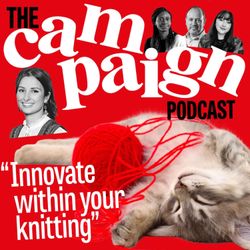
79. How do leaders lead in challenging times?
27:10||Season 4, Ep. 79Campaign has released the A List – a compilation of over 200 industry leaders and their musings on the year gone and year ahead. In 2025, the advertising and marketing industry underwent some huge organisational shifts. With revenue declines and share price drops, job cuts, leadership changes and legacy agencies changing their names, 2026 marks a new era for the industry.In this episode, the Campaign team discuss some of the A Listers' perspectives, including how to be innovative in uncertain times, and what outfits they wear to a pitch.Hosted by tech and multimedia editor Lucy Shelley, this episode includes deputy editor Gemma Charles, editor-in-chief Gideon Spanier and deputy creativity and culture editor Charlotte Rawlings. Further reading:The 2026 A List: 'Massive fuckin' traitors', 'Method Pitchers' and AI-induced boredomHalf of VCCP's current jobs didn't exist at launch, CEO saysThe A List and it’s completely different but it’s also still the A ListCampaign A List 2026: How leaders are planning for success in surprising timesCan we talk about how you get into Campaign's 2027 A List?In Pictures: Campaign A List party 2026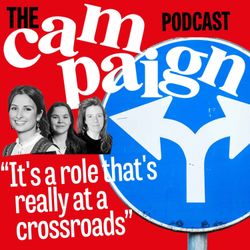
78. What will the media planner of the future look like?
21:06||Season 4, Ep. 78Media planners and buyers, like many in adland, have been tackling a period of immense change. AI, media fragmentation and budget restraints are all impacting the roles within media. At the end of January Campaign hosted Media Week Live, a conference for media planners and buyers, discussing how their roles are changing and what the future of the media agency looks like. Leaders from X, Pinterest, Omnicom, WPP, Publicis and the National Theatre joined to share their perspectives from the top.Campaign's media journalists hosted the event: media editor Beau Jackson and deputy media editor Shauna Lewis. The pair join tech and multimedia editor Lucy Shelley to discuss the future of the media planner and buyer, what part creativity plays in the media plan, how media planners work alongside AI and what challenges media agency leaders are facing this year.Further reading:What does it take to be a media agency chief investment officer?'Frustrating' and 'disappointing': media buyers on Google's action against Kantar Media and BarbThe Lists 2025: Top 10 media buyers‘The weather is changing’: How much should publishers fret about Google AI Overviews?Will media buyers be the first victims of AI?Media buying among 'first areas to go' with rise of AI, says MediaMonks co-founder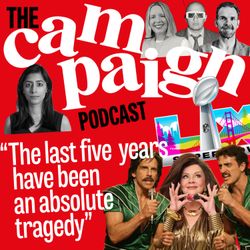
77. How do creatives rate the Super Bowl LX ads?
26:12||Season 4, Ep. 77Following the Super Bowl LX over the weekend, David Kolbusz, chief creative officer at Orchard Creative; Helen Rhodes, chief creative officer at Grey London; and Josh Green, chief creative officer of Elvis review a selection of the ads in this week's episode of The Campaign Podcast. Hosted by Campaign’s creativity and culture editor Gurjit Degun, the trio critique work from Instacart, Anthropic, Squarespace, E.l.f Cosmetics, Pringles, Dove and Bud Light. They also comment on whether this year’s ads are better than those of previous years. Kolbusz said: "The theme for me this year was that people are starting to figure out the Super Bowl again. I think the last five or so years have just been an absolute tragedy."Further reading:Super Bowl 2026 round-up: watch the adsPringles "Can hands" by Grey London Campaign calendar:Audio Advertising Awards: final entry deadline on 12th February, with multi-entry discounts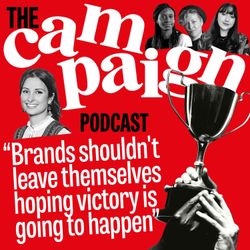
76. What does the fan experience of the Fifa World Cup look like from the UK?
32:25||Season 4, Ep. 76The FIFA World Cup really is bigger this year, taking place in Summer across 39 days, taking place in 16 cities across the US, Mexico and Canada. While all the on-pitch fun is happening across the Atlantic, how can brands across the pond engage UK audiences effectively and authentically?In this episode of The Campaign Podcast, Campaign welcomes guest Lizi Hamer, the global executive creative director at Octagon to discuss some of the biggest mistakes brands make when creating brand experiences around the World Cup, and why advertisers should be thinking community first, not country first.Tech and multimedia editor Lucy Shelley hosts the episode with Campaign's deputy editor Gemma Charles and creativity and culture editor Charlotte Rawlings.Further reading:Beyond borders: why countries don’t define modern fandomFifa 2026’s longer tournament window presents a golden opportunity for fan activationsIdentity launches global sports propositionThe Year Ahead 2026: Cultural trendsThe Year Ahead 2026: ExperiencesCampaign calendar:Audio Advertising Awards: final entry deadline on 12th February, with multi-entry discounts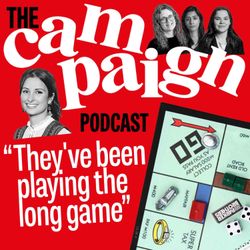
75. What makes an 'agency to watch'?
32:27||Season 4, Ep. 75Campaign's "agencies to watch" lists the top media, creative and new shops that are likely to have an impact in the next 12 months. This episode discusses the chosen agencies, how the lists have changed from 2025, and what makes an agency worth watching, or not.While these lists are not an endorsement of each agency, they have been chosen because these shops went through big changes last year.This episode of The Campaign Podcast is hosted by Lucy Shelley and features editor Maisie McCabe, creativity and culture editor Gurjit Degun and deputy media editor Shauna Lewis.Further reading:Eight new agencies to watch in 2026Seven creative agencies to watch in 2026Eight media agencies to watch in 2026If 'agencies to watch' grow into 'top agencies' and other conundrumsLePub launches in London led by Gina Hood‘The Grey-naissance’: Helen Rhodes plans ‘dollop of stupidity and naivety’ in Grey's return to creative gloryAce of Hearts: dealing adland a new hand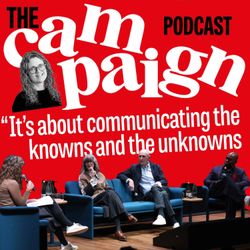
74. What is effective leadership in a time of change? With Mother, Publicis and Omnicom
22:44||Season 4, Ep. 742025 saw an incredible amount of change and pressure for the industry and its agencies – steering the ship through heavy storms has become even tougher.At Campaign's Year Ahead Breakfast Briefing in The National Gallery, editor Maisie McCabe led a discussion on leadership in a time of change, interviewing Dan Clays, CEO of Omnicom Media EMEA, Katie Mackay-Sinclair global chief brand officer at Mother, and Magnus Djaba, chief client officer and Publicis Groupe. This bonus episode of The Campaign Podcast features the entire panel which discusses the impact of AI, structural shifts within agencies and how people should care for each other during timed of change.The Year Ahead Breakfast Briefing featured adland leaders talking about the trends and strategies for 2026, across creativity, technology, leadership, brands and media.Further reading:Agencies need to be AI literate to keep up with clients, Gravity Road global ECD warnsCreativity will see a return to ‘raw human honesty’ in 2026, Kyle Harman-Turner says'Isn't it boring spending in the same place?': the case for a diverse media dietGlobal sentiment towards sustainability has 'fallen off a cliff', Trainline marketer saysThe Year Ahead 2026: Ad agenciesThe Year Ahead 2026: CreativityThe Year Ahead 2026: SocialThe Year Ahead 2026: Cultural trendsThe Year Ahead 2026: Media ownersThe Year Ahead 2026: BrandsThe Year Ahead 2026: TechnologyThe Year Ahead 2026: Media agenciesComing up in the Campaign Calendar:Brand Film Awards: deadline on 29 JanuaryAudio Advertising Awards: second entry deadline on 29th January, with multi-entry discounts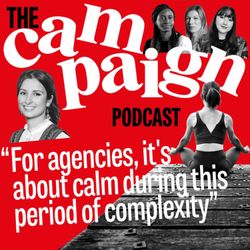
73. What makes adland ‘optimistic’ for 2026?
23:06||Season 4, Ep. 73Adland leaders announced their optimism at last week's Year Ahead Breakfast Briefing in The National Gallery, talking about the trends and strategies across creativity, technology, leadership, brands and media for 2026.Martin Beverley, co-founder and chief startegist at Ace of Hearts spoke about the importance of joy, while Netflix's head of advertising sales Ed Couchman said 2026 will be the year of fandom as consumers are wanting more from brands. Gravity Road's global executive creative director said agencies need to be AI literate to keep up with clients, while creativity will see a return to "raw human honesty" in 2026, said Kyle Harman-Turner, creative partner and executive creative director at FCB London.In this episode, Campaign's journalists who were at the event and on the panels dig into what the industry’s leaders predict for 2026, and why. Tech and multimedia editor Lucy Shelley is joined by deputy editor Gemma Charles, premium content editor Nicola Merrifield and deputy creativity and culture editor Charlotte Rawlings.Further reading:'Isn't it boring spending in the same place?': the case for a diverse media dietGlobal sentiment towards sustainability has 'fallen off a cliff', Trainline marketer saysThe Year Ahead 2026: Ad agenciesThe Year Ahead 2026: CreativityThe Year Ahead 2026: SocialThe Year Ahead 2026: Cultural trendsThe Year Ahead 2026: Media ownersThe Year Ahead 2026: BrandsThe Year Ahead 2026: TechnologyThe Year Ahead 2026: Media agenciesCan we talk about the ethics of AI-fuelled advertising?Coming up in the Campaign calendar: Brand Film Awards: deadline on 29 January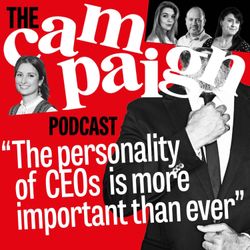
72. Where are the new-business opportunities in 2026?
24:59||Season 4, Ep. 72Campaign LOVES a pitch story, and the tail end of last year was very busy with many pitches taking place or being won right up to the final week. WPP won the £1.5bn government media pitch and the expanded review for Jaguar Land Rover, as well as media for Kenvue, while Publicis Groupe picked up the creative for the consumer healthcare company. Aviva's creative account went to Saatchi & Saatchi and the shortlist for IKEA was announced with Just Eat also yet to conclude. In this episode, Campaign digs into the state of new business last year, and where the opportunities lie in 2026, examining which sectors and disciplines will likely see more pitches over the next 12 months.Tech and multimedia editor Lucy Shelley hosts the episode featuring Campaign's editor-in-chief Gideon Spanier, data journalist for Campaign Red Jamie Rossouw and deputy news editor, Marianne Calnan-Holland.Further reading:The CMO Outlook 2026UK new-business rankings: latest 2025Two-thirds of CMOs 'definitely' pitching in next 12 monthsMars to switch $1.7bn media account out of WPPNatWest picks IPG as it consolidates media and creative accountSantander appoints Publicis to global creative and media businessStarling banks on network media agency after three-way contestPublicis agency swipes Monzo media account after BBH creative winAsda confirms media and creative agency appointmentsPublicis scoops Coca-Cola media in North AmericaComing up in the Campaign calendar: Brand Film Awards: deadline on 15 January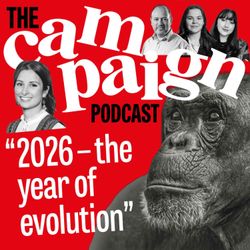
71. What should adland’s new year resolutions be?
27:55||Season 4, Ep. 71As the "happy new years" ring out, what resolutions are those in adland setting for 2026?Last year unleashed a relentless wave of change across the advertising and media industry, from agency mergers and closing shops to restructures, the growing prominence of social and tech platforms, and some great creative work. Now, in 2026, Campaign begins the year with a look at what adland’s new year resolutions should be, what the industry should give up and what is coming up in 2026. Over the next few weeks, Campaign is releasing essays on the year ahead and the top agencies to watch.Editor-in-chief Gideon Spanier, deputy creativity and culture editor Charlotte Rawlings and deputy media editor Shauna Lewis join the episode, hosted by tech and multimedia editor Lucy Shelley.Further reading:The Year Ahead 2026: Media agenciesThe Year Ahead 2026: StrategyThe Lists 2025: Top 20 film adsThe Lists 2024: Top 10 campaignsHas 2025 been the year for independent agencies?Traitor or faithful – what will adland remember about 2025?Will the new Omnicom work?
loading...